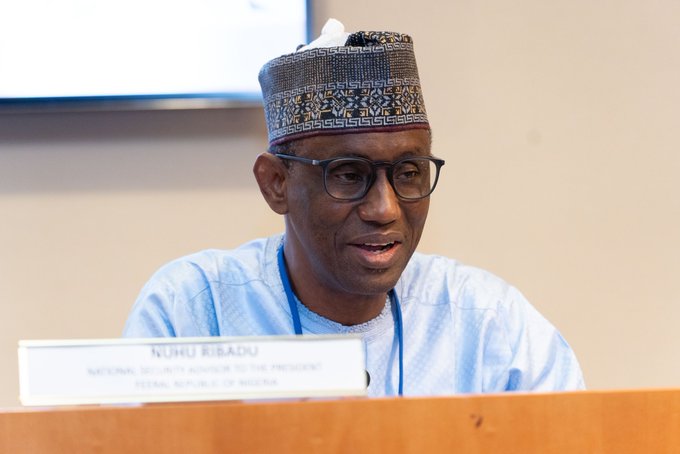In an escalating diplomatic row between Nigeria and Niger, the National Security Adviser (NSA), Malam Nuhu Ribadu, has fiercely dismissed accusations from Niger’s military government that Nigeria was conspiring with France to destabilize Niger. Speaking in a detailed interview with BBC Hausa on Friday, Ribadu labeled the allegations as unfounded and urged Niger’s leadership to address their grievances with France, rather than implicating Nigeria in their internal conflicts.
“We are committed to regional peace and cooperation,” Ribadu stated, refuting claims by General Abdulrahman Tchiani, the leader of Niger’s military junta, who had accused Nigeria of facilitating a destabilizing military presence near the Niger-Nigeria border. The controversial allegations, which have further strained already tense diplomatic relations, were swiftly condemned by Nigerian authorities.
Tchiani’s accusations suggested that Nigeria was secretly setting up military camps in the northern regions, specifically between Munguno and Baga in Borno State, allegedly housing French soldiers in an operation codenamed “Canada.” He further claimed that Nigerian soil was being used to train fighters in the northern states of Sokoto, Zamfara, and Kebbi, with the aim of undermining Niger’s stability. The Nigerien leader also accused Nigeria of harboring former members of the ousted Bazoum administration and collaborating with foreign powers in a bid to destabilize his country.
“False Accusations”
Ribadu, however, vehemently rejected the allegations, pointing out the unsubstantiated nature of the claims. “Even England, which colonized Nigeria, never stationed soldiers here. When France wanted to bring its troops, we refused. Why should we agree now?” Ribadu quipped, highlighting Nigeria’s independence in military decisions and its longstanding policy of non-interference in Niger’s internal affairs.
In his response, Ribadu called on journalists and the general public to verify the claims on the ground, questioning the credibility of Tchiani’s assertions. “Niger’s allegations are based on unverified rumors and have no foundation in fact,” he added, challenging the credibility of the accusations.
The NSA emphasized that Nigeria’s primary concern was the fight against terrorism, not engaging in conflicts with its neighbors. “Our shared enemy is terrorism, not each other,” Ribadu declared, underlining the importance of cooperation among neighboring nations to combat the growing threat of extremist groups across the region.
He further stressed that Nigeria had always prioritized unity in West Africa and remained committed to fostering peaceful relations with its neighbors. “We must work together to secure our communities and resist external interference,” Ribadu continued, signaling Nigeria’s unwavering stance on regional stability.
Tensions Mount Between Niger and Nigeria
The ongoing diplomatic friction between Niger and Nigeria is not a recent development. It began to intensify following the military coup in Niger in July, which ousted President Mohamed Bazoum. Since then, the relationship between the two nations has become increasingly strained, with Niger accusing Nigeria of hosting members of the ousted regime and allegedly participating in efforts to undermine the military junta.
Despite Nigeria’s repeated denials, tensions have simmered. The latest allegations of military collusion with France have added fuel to the fire, putting further pressure on the already fragile relationship between the two countries.
In response to Tchiani’s claims, the Nigerian government issued a strong denial on Thursday, reiterating that Nigeria had no involvement in the destabilization of Niger. A statement from the Ministry of Foreign Affairs emphasized that Nigeria remained committed to the principle of non-interference in the internal affairs of other nations.
“Niger’s accusations are not only baseless but are also dangerous,” the statement read, urging the Nigerien government to focus on addressing its internal challenges rather than casting blame on its neighbors.
Regional Cooperation vs. External Allegiances
One of the key issues fueling the dispute is the role of foreign powers, particularly France, in the region. Niger’s military government has expressed concern over what it perceives as France’s growing influence, especially after the French military presence in several West African nations. The junta has accused Nigeria of supporting France’s military presence near Niger’s borders, further complicating an already complex geopolitical situation.
Ribadu, however, downplayed the allegations of Nigerian complicity in France’s military operations. He reiterated that Nigeria’s position on foreign military involvement had always been clear, with the country rejecting any foreign presence on its soil unless it aligned with national interests.
“We believe in sovereignty and non-interference in the affairs of others,” Ribadu said firmly. “It is imperative for African nations to work together, respecting each other’s sovereignty and working to combat common threats like terrorism.”

